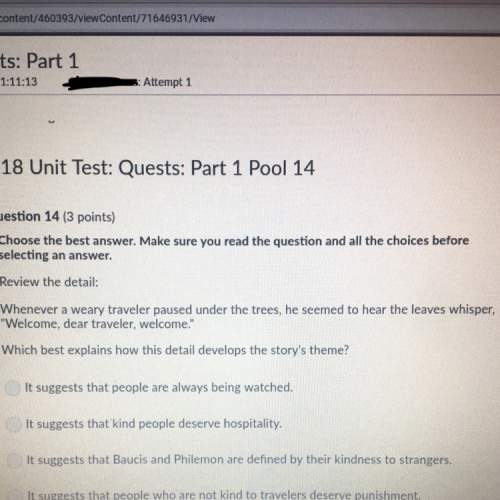
Answers: 2


Another question on English


English, 21.06.2019 21:20
Read the sentences below and complete the instruction that follows. the coach, who has ten years' experience, has agreed to lead our team. the coach who has ten years' experience has agreed to lead our team. select the answer that explains the difference between the two sentences, as well as the purpose each clause serves for the benefit of the reader. a.) the first sentence contains a noun clause that functions as a predicate nominative; therefore, it renames the subject of the sentence for the reader. the second sentence contains an essential adjective clause that modifies the noun "coach"; therefore, it clarifies for the reader which coach is being discussed. b.) the first sentence contains a nonessential adjective clause that modifies the noun "coach"; therefore, it provides the reader with interesting details about the subject of the sentence. the second sentence contains an essential adjective clause that modifies the noun "coach"; therefore, it clarifies for the reader which coach is being discussed. c.) the first sentence contains a nonessential adjective clause that modifies the noun "coach"; therefore, it provides the reader with interesting details about the subject of the sentence. the second sentence contains a noun clause that functions as a predicate nominative; therefore, it renames the subject of the sentence for the reader. d.) the first sentence contains an adverb clause that modifies the verb "agreed"; therefore, it provides the reader with the answer to the question "when." the second sentence contains an essential adjective clause that modifies the noun "coach"; therefore, it clarifies for the reader which coach is being discussed.
Answers: 1

English, 21.06.2019 22:00
Select the correct answer. read this excerpt from leo tolstoy's the death of ivan ilyich: her attitude towards him and his diseases is still the same. just as the doctor had adopted a certain relation to his patient which he could not abandon, so had she formed one towards him—that he was not doing something he ought to do and was himself to blame, and that she reproached him lovingly for this—and she could not now change that attitude. "you see he doesn't listen to me and doesn't take his medicine at the proper time. and above all he lies in a position that is no doubt bad for him—with his legs up." she described how he made gerasim hold his legs up. the doctor smiled with a contemptuous affability that said: "what's to be done? these sick people do have foolish fancies of that kind, but we must forgive them. . " they all rose, said good-night, and went away. when they had gone it seemed to ivan ilyich that he felt better; the falsity had gone with them. but the pain remained—that same pain and that same fear that made everything monotonously alike, nothing harder and nothing easier. everything was worse. again minute followed minute and hour followed hour. everything remained the same and there was no cessation. and the inevitable end of it all became more and more terrible. based on the excerpt, how is praskovya fedorovna a character foil to ivan ilyich? a. she is kind and takes care of ivan, which is why he feels guilty about how he treated her for most of their married life. b. she is vindictive toward ivan while pretending to be worried about him, thus reminding him of how his family has never forgiven him. c. she plays the part of the worried wife without any real feeling, symbolizing the false propriety ivan upheld but now hates. d. she is young, healthy, and beautiful—everything ivan can never be again and wishes he could return to. reset next
Answers: 1

English, 21.06.2019 23:00
Read the excerpt from a supporting opinion of the supreme court’s ruling in plessy v. ferguson, 1896. laws permitting, and even requiring, their separation in places where they are liable to be brought into contact do not necessarily imply the inferiority of either race to the other, and have been generally, if not universally, recognized as within the competency of the state legislatures in the exercise of their police power. how does this relate to the premises of brown v. board of education? the brown case addresses whether state legislatures are equipped to judge the quality of education offered at segregated schools. the brown case addresses whether authorities believe that one race is inferior to another when creating public schools. the brown case addresses whether these laws inherently deny certain citizens equal protection under the law. the brown case addresses the legality of using police power to monitor public places separated by race.
Answers: 3
You know the right answer?
Can I move the bench?(passive statement)...
Questions

Mathematics, 31.01.2020 23:45

Advanced Placement (AP), 31.01.2020 23:45

Mathematics, 31.01.2020 23:45

Mathematics, 31.01.2020 23:45


Advanced Placement (AP), 31.01.2020 23:45


Physics, 31.01.2020 23:45

Mathematics, 31.01.2020 23:45




Mathematics, 31.01.2020 23:45

Geography, 31.01.2020 23:45

History, 31.01.2020 23:45





Mathematics, 31.01.2020 23:45




